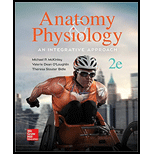
Concept explainers
Introduction:
Blood is a connective tissue which flows from the heart through arteries and veins to all body parts. Whole blood consists of two elements- formed elements and plasma. The total volume of formed elements in the blood which are erythrocyte, platelets, and leukocytes is called as hematocrit. But clinically the total percentage of erythrocytes in blood is known as hematocrit.
Answer to Problem 1DYKB
Correct answer:
The value of hematocrit varies according to sex and age of individuals. The hematocrit of very young children may vary from
Explanation of Solution
Reason for the correct statement:
Option b. is given as “a dehydrated adult male”. The percentage of hematocrit is affected by dehydration condition. If a person has a high hematocrit range it means the person is either suffering from dehydration or is involved in blood doping. As the value of hematocrit is already higher than children and females, its value will increase more in dehydration condition. Thus, the hematocrit value of a dehydrated male will be maximum. Hence; the hematocrit value would be highest in a dehydrated male.
Hence, option b. is correct.
Reasons for the incorrect statements:
Option a. is given as “a 10-year old child”. The hematocrit of very young children may vary from
Option c. is given as “a healthy, nonmenstruating female”. In adult females, the hematocrit value ranges between
Option d. is given as “a healthy, menstruating adult female”. In adult females, the hematocrit value ranges between
Hence, options a., c., and d. are incorrect.
The hematocrit range value would be highest in a ten-year-old boy than a dehydrated male and a healthy female.
Want to see more full solutions like this?
Chapter 18 Solutions
ANAT&PHY TEXT W/CONNECT &LRNSM ACCESS
- Progressive hemothorax does not include() A) Abnormal respiratory movement B) Progressive increase of intrapleural pressure C) Venous pressure increased, heart beat weak, arterial pressure decreased D) Mediastinal flutter during breathing E) The blood volume of thoracic drainage was more than 200 ml / h for 3 hoursarrow_forwardWhat complication is characterized by a sudden, severe headache, visual disturbances, and possibly seizures in a woman with preeclampsia? A) Gestational hypertension B) Eclampsia C) Chronic hypertension D) HELLP syndromearrow_forwardA person who is hyposecreting EPO and has an increased hematocrit: A. may have anemia B. may have primary polycythemia C.may have secondary polycythemiaarrow_forward
- What condition is characterized by high blood pressure and proteinuria in a pregnant woman? A) Gestational diabetes B) Preeclampsia C) Eclampsia D) Chronic hypertensionarrow_forwardThe modifiable risk factor associated with coronary artery disease is (a) Age (b) Obesity (c) Heredity (d) Genderarrow_forward
 Medical Terminology for Health Professions, Spira...Health & NutritionISBN:9781305634350Author:Ann Ehrlich, Carol L. Schroeder, Laura Ehrlich, Katrina A. SchroederPublisher:Cengage Learning
Medical Terminology for Health Professions, Spira...Health & NutritionISBN:9781305634350Author:Ann Ehrlich, Carol L. Schroeder, Laura Ehrlich, Katrina A. SchroederPublisher:Cengage Learning Comprehensive Medical Assisting: Administrative a...NursingISBN:9781305964792Author:Wilburta Q. Lindh, Carol D. Tamparo, Barbara M. Dahl, Julie Morris, Cindy CorreaPublisher:Cengage Learning
Comprehensive Medical Assisting: Administrative a...NursingISBN:9781305964792Author:Wilburta Q. Lindh, Carol D. Tamparo, Barbara M. Dahl, Julie Morris, Cindy CorreaPublisher:Cengage Learning- Essentials of Pharmacology for Health ProfessionsNursingISBN:9781305441620Author:WOODROWPublisher:Cengage





